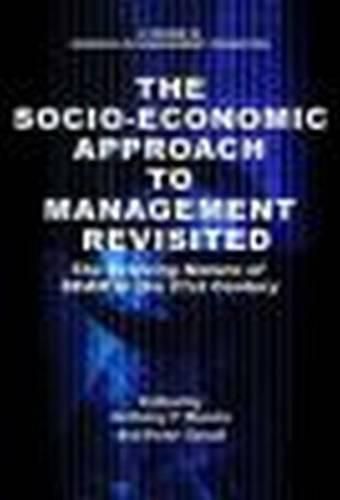Readings Newsletter
Become a Readings Member to make your shopping experience even easier.
Sign in or sign up for free!
You’re not far away from qualifying for FREE standard shipping within Australia
You’ve qualified for FREE standard shipping within Australia
The cart is loading…






This title is printed to order. This book may have been self-published. If so, we cannot guarantee the quality of the content. In the main most books will have gone through the editing process however some may not. We therefore suggest that you be aware of this before ordering this book. If in doubt check either the author or publisher’s details as we are unable to accept any returns unless they are faulty. Please contact us if you have any questions.
This volume is part of the ongoing collaboration between the RMC series and the Socio-Economic Institute for Firms and Organizations (ISEOR), a French intervention-research think tank co-directed by Henri Savall and Veronique Zardet. Building on an earlier collaboration on the ISEOR approach - Socio-Economic Intervention in Organizations: The Intervener-Researcher and the SEAM Approach to Organizational Analysis (IAP, 2007) - Buono and Savall bring together over 30 talented intervener-researchers to explore and examine the ongoing evolution of the Socio-Economic Approach to Management (SEAM).
This volume revisits the application of SEAM in the context of intervention challenges in the wake of the recent economic crisis and the disruptivechange that has taken hold across the world. The basic foundation of SEAM - built on the idea of strategic patience, the need to undertake holistic intervention in organizations, and the challenge to get organizational members to listen to themselves (through what they refer to as the mirror effect) - has remained the same. In response to economic and organizational pressures in the current environment, however, there has been a concomitant emphasis on helping client organizations achieve short-term results while still maintaining focus on the long term. Many ideas that have become part of the current discourse within ISEOR today were not as explicitly addressed in the initial volume - from the destructive effect of the Taylorism-Fayolism-Weberism (TFW) virus, to the need to focus on ways to ensure the sustainability of a SEAM intervention, the growing importance of collaborative interactions between external and internal consultants, and the growing importance of cocreating knowledge with client firms and organizations.
$9.00 standard shipping within Australia
FREE standard shipping within Australia for orders over $100.00
Express & International shipping calculated at checkout
This title is printed to order. This book may have been self-published. If so, we cannot guarantee the quality of the content. In the main most books will have gone through the editing process however some may not. We therefore suggest that you be aware of this before ordering this book. If in doubt check either the author or publisher’s details as we are unable to accept any returns unless they are faulty. Please contact us if you have any questions.
This volume is part of the ongoing collaboration between the RMC series and the Socio-Economic Institute for Firms and Organizations (ISEOR), a French intervention-research think tank co-directed by Henri Savall and Veronique Zardet. Building on an earlier collaboration on the ISEOR approach - Socio-Economic Intervention in Organizations: The Intervener-Researcher and the SEAM Approach to Organizational Analysis (IAP, 2007) - Buono and Savall bring together over 30 talented intervener-researchers to explore and examine the ongoing evolution of the Socio-Economic Approach to Management (SEAM).
This volume revisits the application of SEAM in the context of intervention challenges in the wake of the recent economic crisis and the disruptivechange that has taken hold across the world. The basic foundation of SEAM - built on the idea of strategic patience, the need to undertake holistic intervention in organizations, and the challenge to get organizational members to listen to themselves (through what they refer to as the mirror effect) - has remained the same. In response to economic and organizational pressures in the current environment, however, there has been a concomitant emphasis on helping client organizations achieve short-term results while still maintaining focus on the long term. Many ideas that have become part of the current discourse within ISEOR today were not as explicitly addressed in the initial volume - from the destructive effect of the Taylorism-Fayolism-Weberism (TFW) virus, to the need to focus on ways to ensure the sustainability of a SEAM intervention, the growing importance of collaborative interactions between external and internal consultants, and the growing importance of cocreating knowledge with client firms and organizations.